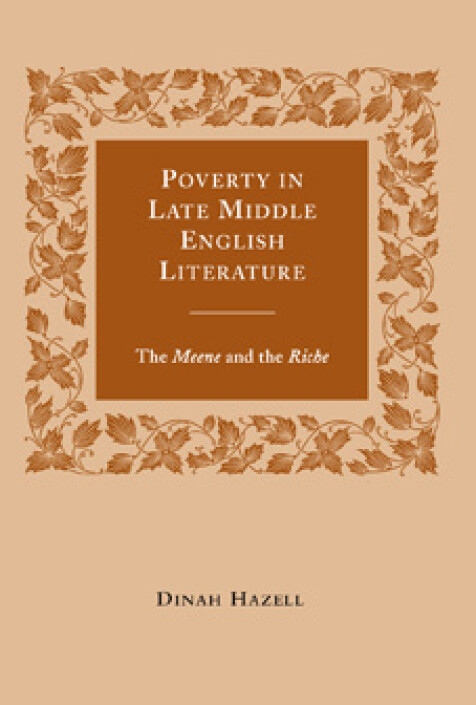Poverty in late Middle English literature
The meene and the riche
Dinah Hazell
'In this fine, innovative study, Hazell brings together a wealth of information on poverty in the late Middle Ages and on literary attitudes to such poverty, thereby providing a cultural context in which to understand the issue … Hazell culls information in a new, comprehensive way, and in so doing she gives the reader a solid picture of poverty and of late medieval attitudes towards it … Recommended', J. Cowgill, Choice (April 2010).
'Dinah Hazell presents a comprehensive account of the representation of poverty in a wide range of Middle English texts … The great value of Hazell's book lies in its comprehensive cataloguing of depictions of poverty in a variety of texts not frequently considered together. Works in a range of genres from romances and saints' lives to drama and satire are included, and there are some interesting and unusual choices … Hazell convincingly shows the importance of the subject of poverty to a large number of Middle English texts (not just the “usual suspects” like Piers Plowman), and it is to be hoped that her book will stimulate others to follow her example in casting further light on the place in literature of those “hidden and silenced” medieval poor', Sarah Wood, Medium Aevum (Fall/Winter 2010).
‘Hazell uses poverty as an entry-point into exploring a wider range of medieval English attitudes surrounding money and social status. Each chapter begins with an overview of the social and economic conditions relevant to its particular form of poverty, and then moves on to a close reading of several representative texts depicting it … the main strength of Poverty in Late Middle English Literature is that it brings together a variety of different texts depicting poverty in disparate ways and with disparate rhetorical emphases … Many of these texts have never before been brought into conversation with each other, and Hazell’s book succeeds in showing that such a conversation is possible', Elizabeth Harper, The Medieval Review (May 2010).
[This book] brings erudition and clarity to what might otherwise be an obscure subject', Books Ireland (September 2009).
‘Hazell examines the attitudes toward poverty in late medieval England through the literature of the time. Her sources vary from well-known authors such as Hoccleve, Gower and Chaucer to anonymous poets, creators of town plays, and saint’s lives', Reference and Research Book News (November 2009).
‘This book takes on the complex topic of poverty in late-medieval England, and it seeks to address its subject fully with attention to poverty’s economic, historical, religious and literary significance. This is not an easy task given how medieval conceptions of poverty resist easy distinctions … perhaps the greatest virtue of Hazell’s work is its apt demonstration of this capaciousness. The framework of the book and its focus on the different types of poverty reveal the concept’s flexibility … Similarly, Hazell’s focus on a broad range of texts reveals how thoroughly the topic of poverty permeates the generically diverse literature of the period … For someone hoping to gain a sense of poverty’s complexity and importance in late-medieval England, this book will provide a helpful overview of the concept’s potential meanings, its relevance to general historical events, and its representation in an assortment of literary texts', Kate Crassons, Speculum (April 2011).

